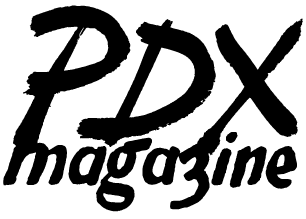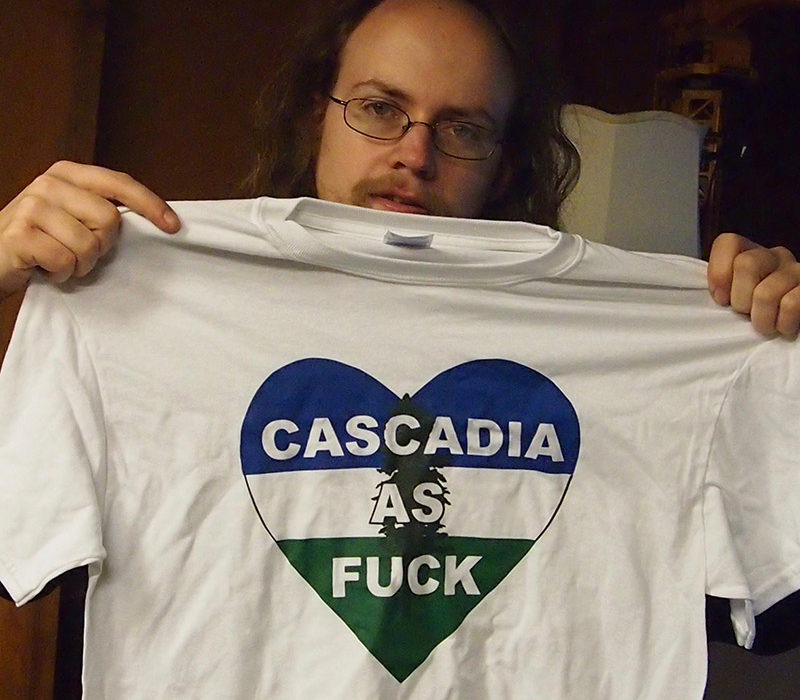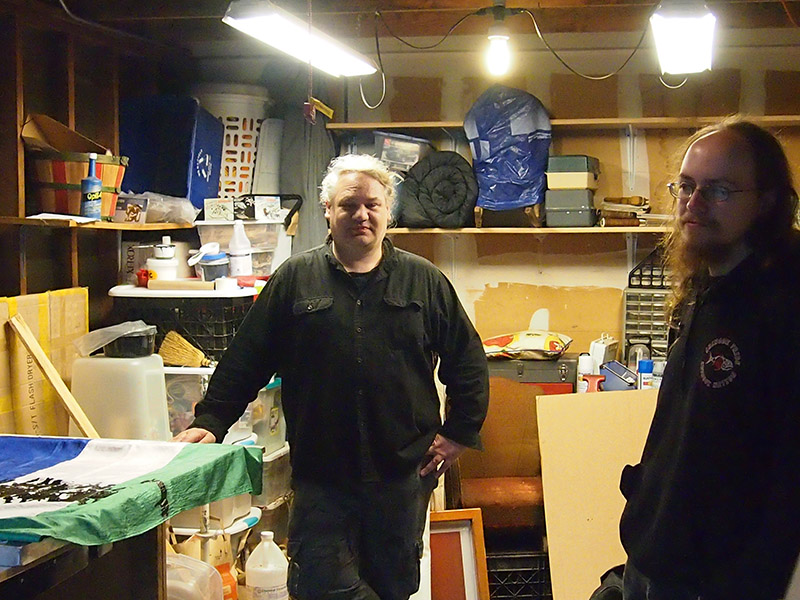By Mike Allen
Cover photo of Robert Izzat by Mike Allen
Ideas ain’t worth shit. No one cares about ideas until they have some tangible value or physical manifestation to justify the brain weight. Case in point: I’ve been trying to give away this writing (just portable ideas really), and no one wants that bullshit. Maybe I’m a shit writer, or maybe I need to treat my words as a valuable commodity, with a commensurate price.
Here’s a better case in point: Alexander Baretich, a guy who bursts at the seams with ideas. Like an itinerant philosopher, he discourses on a steady stream of things you probably heard about in critical theory classes: deconstructing colonialism, critiquing the nation-state, engagement with the disenfranchised, et cetera. Boring stuff mostly. But me, I’m rapt. I love this anti-imperialist, deconstructing Otherness crap. It helps that my critical studies professor was pretty hot.
So what did Baretich do with these ideas? Why have I even heard of him? I don’t just read Jacques Derrida and Martin Buber for fun. He designed a symbol, a flag even. Personally, I’d prefer a kite. No one flies flags anymore. But now we’ve got something tangible, something we can put our hands on. Now people are interested! They print this symbol on bandanas, t-shirts, patches, socks…the schwag, and the marketing opportunities, go on. They sell it at soccer games!
Cascadia, fuck yeah! Cut a slab off the log for the motherfuckin’ goals yeah!
I’m not sure that Baretich knows about the Timber Joey tradition. He doesn’t seem like the type of guy who’d willingly attend a sporting event. This is a guy who used to take direct action against timbering operations near his childhood home in SW Portland: painting brown over the orange tree blazes to confuse the loggers, tearing down realtor’s signs on vacant lots, and damaging equipment. Yet it’s his Cascadian “Doug” flag they fly at the Timbers games, and he helped popularize that tradition, by standing outside Providence Park selling miniature versions of his design.
The Cascadia bioregional movement can perhaps be traced back to a timber protest in the mid ’90’s, when radical young people were still up in arms about the loss of old growth forests. In 1995, the Warner Creek sale was scheduled as a salvage operation of old growth timber outside of Eugene. A forest fire had raged through the spotted owl habitat in 1991, and environmental activists suspected it was arson by loggers or a timber company. Following what activists claimed was standard protocol, the US Forest Service sold a portion of the remaining timber to a logging company, regardless of the recommendations of their own biologists. Lacking social media, activists literally set out deep into the wilderness to sit in front of bulldozers and climb tall trees with bags of granola and a bucket to shit in for a week. Now, you’d be lucky to trend a hashtag: #canceltimbersales.
But it worked. The sale was canceled. The Cascadia Free State went on to tree-sit for another 20 years.
And here’s the problem with symbols—especially in an age where intellectual property protection is suspected as a capitalist high crime: You can’t control the ideas attached to the symbol. Especially when you put it in the Creative Commons, anybody can take it and say it means whatever they like.
The most famous misappropriation of the flag: Cascadian secession.
Baretich has explicitly disavowed secession on his blog and elsewhere, and he resents the attempts of some journos to paint him as a guy who just wants to form a country that’s way cooler than the rest of America. In any case, secession means another nation-state, and the nation-state is for assholes. The bioregion is where Baretich is at.
Physically, topographically, the Cascadian bioregion encompasses the watershed from the peaks of the northern Rockies to the Pacific, skirting the Great Basin in the southeast and tapering into southern Alaska and the Yukon territory in the north. And just shutting out central and southern California altogether because…come on. But in Baretich’s mind, a bioregion is not a prospective nation. A modern nation is a colonized place, polluted with the structures, thoughts, and systems of the colonizers; and a bioregion wants none of that.
Mass, Mind, and Metropole. These are the colonized spaces the Cascadian must work to decolonize.
Mass: the actual, literal place—the mass of land. The Cascadian will decolonize the land by removing imported elements that interfere with the natural rhythms of the place, like dams, wheat farms, and oil pipelines. As an avowed materialist, I’m ready to stop.
But Mind: the Cascadian will decolonize her mind of the reductionist, Newtonian view of people being “wired” a certain way. What makes them tick? They don’t tick; people aren’t watches. You can’t “decode” or “engineer” the natural world, because the essential reality of rivers and wheat and frogs and people transcends empiricism. That’s what Baretich calls “neo-romanticism.” The transcendentalist in me likes it.
Then there’s the pesky, ruinous Metropole. Those are the cities. “Mother cities,” Baretich calls the worst of them: Rome, London, Washington DC. I can see my post-colonial literature professor challenging this metaphor: Is the mother really the life-sucking force of colonial societies? In any case: the mass of land and its people we discussed at the beginning of the lesson, exist to feed the mother city. If Cascadia broke off, that would likely be Seattle (but only because the Canadians are too nice for Vancouver, BC to claim its rightful place as big momma metropole).
So what do we do? How do we challenge the nation-state’s ideological, psychological, and economic dominance? I ask. Apparently, it’s a lot of physical work. Jesus, hasn’t this guy heard of Facebook?
Literal, physical engagement with the colonized people is the first step to decolonization. The Cascadian movement is very preoccupied with indigenous people. We colonizers, and sons and daughters of colonizers, are all proto-Cascadians, not sufficiently awakened to the fundamental reality of the natural spaces we inhabit.
We need to meet with the tribes and tribespeople (presumably not via facetime), learn their needs, and work to respond to those needs. Respect the treaties, and fight the powers that would exploit our collective natural wealth, like Nestlé and the natural gas industry.
Then: the Cascadian economy will be defined by local production meeting local needs. Baretich once told some Timbers schwag vendors to go ahead and order a couple of loads of flags from Chinese manufacturers, just to “get the meme out there,” as he says. I’m not sure how he thought he would get that horse back in the barn. But now he’s found that there really isn’t much in the way of local manufacturing at all. So he formed a cooperative with a couple of other people to manufacture the flag here, in a tiny garage in Multnomah Village.
And this garage is tiny. It’s no Silicon Valley “garage,” which I imagine to be immense warehouses that happen to have garage doors. It’s stuffed with storage: boxes of t-shirts, plastic shelving piled high with the ephemera of life, drawers full of doodads. There’s barely enough room to work. The table where the magic happens, or will happen, is the size of a drafting table. All that’s on it is a printing screen.
The cooperative had put together a crowdfunding effort, but they were beat to the punch by a more business-savvy competitor—a usurper to the philosophy of Cascadia and vendor of a panoply of Cascadian schwag. It’s the patches that Baretich doesn’t like.
“They create a sense of exclusiveness, which is not what I wanted.”
It’s the lack of interest in…ideas.
“They want to make it into a movement, but they don’t go into real intellectual depth,” he says, ”because if you start talking about it, they’re going to get bored.”
Let’s face it though, patches are more fun than intellectual depth. Depth is tedious. Patches are like bumper stickers for your clothes.
Still, the Cascadian Flag Making Cooperative raised a little under $4000, promising flags to the biggest donors. But those donors are still waiting, because it turns out that manufacturing flags is hard work that requires a modicum of hand skills. So the philosopher has to remake himself into a laborer, a craftsperson even. Fortunately, Baretich has Robert Izzat, a parcel delivery driver of Chinook descent, who knows how to get things done.
Tailors come and go. Material is hard to come by. The screen printing process takes practice. But if you want to own your own ideas, rather than just float them out into the ether, you gotta do the work, or raise a lot of capital.
So would Baretich do it the same if he could do it all over? Would he put the flag into the commons for any ideological vulture to rip to shreds?
He shakes his shaggy head. No…
But then Izzat, the pragmatist, the guy who isn’t afraid to get his hands dirty, who has had very little to say thus far, speaks up:
“But conversely, if you had copyrighted it like that other guy—”
That other guy is David McCloskey, who created his own Cascadian flag in the same exact year that Baretich created his. Do you know what it looks like? Have you ever seen it flown? Me neither. It exists on his website, and there alone. There’s precious little chance that the McCloskey flag will ever appear on a beer bottle, or be used to commemorate a soccer goal, which I suppose is the point. But there’s even less of a chance that it will ever be recognized as the de-facto flag of a region. smfh.
And, ideologically speaking, Baretich acknowledges that all is not lost. When he started out selling his little flags at the games, he asked people what they thought it stood for. At first, people said, “secession, or a new nation-state.
“But the last year we were doing that,” Baretich says, “people would say ‘Oh, it’s about bioregionalism, it’s about localization, permaculture, living sustainably with the environment.’ It was pretty amazing to see that shift.”
Mike Allen blogs at ArbiterOfDistaste.com


